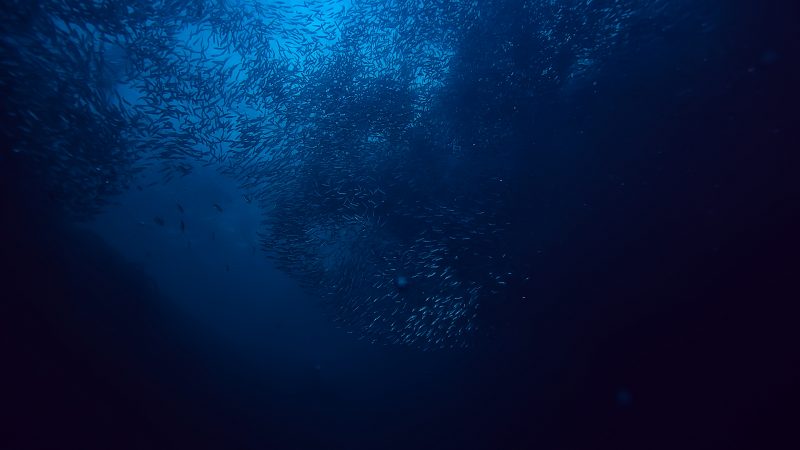
No doubt there are some people in parliament who can think of no better place to have Barry Gardiner deposited than 100 feet under the North Sea. Some may even be in my own party! But I wear it as a badge of pride that a boulder with my name on it, weighing half a tonne, will cause a nasty shock to anyone trawling for fish in one of our most important marine protected areas (MPAs): the Dogger Bank.
The Dogger Bank is the largest sandbank in UK waters. It provides a habitat for a wide range of species living both on and within the seabed, which are a vital food source for whales, porpoises, dolphins, cod and seabirds like puffins. The protected feature in the Dogger Bank MPA is the seabed itself, but strangely it is not being protected. The government allows scallop dredgers and beam trawlers to plough up the very feature it is supposed to have protected.
Bottom trawling catches demersal species that live on or close to the seabed, but it is a particularly destructive fishing method. It not only removes vast quantities of fish, but also scrapes and ploughs the seabed, disrupting sediment, destroying habitat and killing large numbers of vital bottom-dwelling organisms. That is why Greenpeace has deposited a number of what I like to call ‘boulder Barry-ers’ to disrupt this devastating mode of fishing.
Our seas and oceans are facing more pressures than at any time in human history. Last year, just 59% of UK fish stocks were fished at or below sustainable levels. Turn that figure round and you get a sense of the damage being done: 41% of all fish stocks were being overfished in a way that will lead to the decline and eventual collapse of that species. That is 10% worse than it was just the year before.
The scale of some of these gargantuan vessels is awesome. Over 100 metres in length, they use nets over a mile long with a gaping mouth 200-300 metres wide. These ‘super trawlers’ spent about 3,000 hours fishing in MPAs all around the UK last year – the equivalent of 123 days. The biggest super trawler on the planet, the Annelies Ilena, has been fishing in our supposed protected areas. It can carry approximately 10,000 tonnes – the weight of the Eiffel Tower – in fish. Is it any wonder that only five out of the UK’s 73 MPAs are making any progress towards their conservation target?
Governments love big announcements: ‘championing this initiative’, ‘world-beating that record’. And this government is no exception. Boasting of establishing the Global Ocean Alliance and championing the creation of marine sanctuaries covering 30% of the world’s oceans by 2030. This is blue not just as a political colour but a branded ‘blue-belt’ initiative of designated MPAs around all our overseas territories. It is great. It is big. It is sexy. I support it – but the key word is protected.
It is not enough to simply designate MPAs. The whole point is to protect them. Rhetoric breaks down when one of our most important, Dogger Bank, is being ravaged not only by super trawlers but also by sandeel fisheries, scallop dredging, electric pulse fishing and pair trawling. The reality is that this government is failing to protect our most important and vulnerable marine ecosystems. The answer is simple: ban destructive and industrial fishing vessels from all UK MPAs. That ban, backed up by fisheries protection vessels and the Royal Navy, would be an important first step towards establishing a coherent network of marine sanctuaries. Enforcement will be the test of the rhetoric.
Such a ban would help boost our inshore fishing industry. One square mile of fully protected ocean produces five times the amount of fish than an equivalent unprotected area. That’s because fish in protected areas grow to maturity, which means they have higher reproductive outputs. The orange roughy fish in the North East Atlantic may take 30 years to mature and, as it grows older and larger, its fecundity shoots up. At just over a kilo, a young female will produce just over 30,000 eggs, but an older five kilo fish will produce 170,000. And because fish and their eggs disperse out from the MPA to surrounding areas, this has a positive impact on fishery yields outside the protected areas themselves. This spillover effect to other local waters would help revitalise fish stocks, benefitting small-scale, low-impact fishers who see increases to their catch.
Without government action it is up to non-governmental organisations such as Greenpeace to act. But there is only so much they can do. This year they will carefully plant ‘boulder Barry-ers’ to protect 47 square miles of MPAs – an important token – but a token in an ocean. It is government that must take action, raising the reality to the rhetoric so that an MPA becomes exactly what it says: protected. Until that time, the boulders are the only thing truly protecting these precious marine ecosystems.




More from LabourList
Nudification apps facilitate digital sexual assault – and they should be banned
Diane Abbott suspended from Labour after defending racism comments
Labour campaign groups join forces to call for reinstatement of MPs